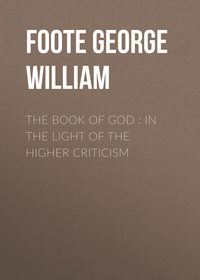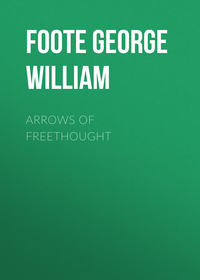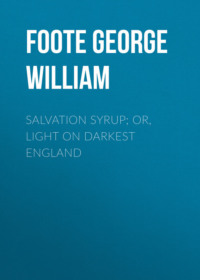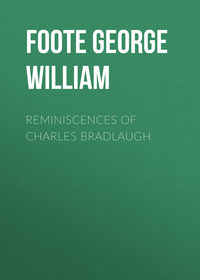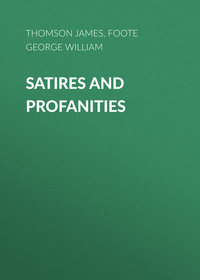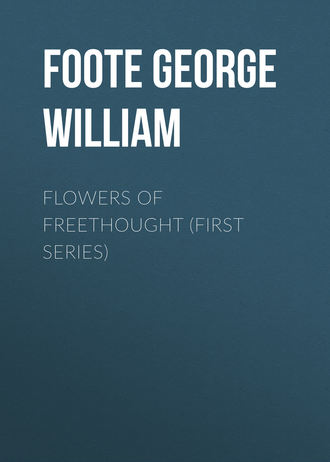 полная версия
полная версияFlowers of Freethought (First Series)
The general public, however, eighteen hundred years ago, did not know how long the prophecy was to remain unfulfilled, and it had an extraordinary power over them. Being mostly very ignorant, and therefore very credulous, they were easily terrified by the notion that the world was to be burnt up speedily; and they as readily embraced the doctrine which promised to bring them safely through the catastrophe. From the way in which the game answers still with the Christian mob, after nearly two thousand years of exposure, we can understand what a splendid instrument of proselytising it must have been in the hands of the fanatical preachers of the early Church. Combine with it the Millennium promised to the saints after the Second Coming of Christ, in which they were to enjoy themselves royally, and you will feel the justice of Gibbon's remark that "it must have contributed in a very considerable degree to the progress of the Christian faith." It was inculcated by a succession of Fathers, from Justin Martyr to Lactantius. But when it had served its purpose it was allowed to drop. As Gibbon says, "it was at first treated as a profound allegory, was considered by degrees as a doubtful and useless opinion, and was at length rejected as the absurd invention of heresy and fanaticism." The Millennium is stigmatised, in what once stood as the forty-first Article of the English Church, as "a fable of Jewish dotage." We wonder whether the plain-spoken divines who drew up that article included Jesus Christ, St. Paul, and St. John among the Jewish dotards.
At the end of the tenth century the doctrine of the Second Coming was revived. The people were led to believe that the old serpent's thousand years of bondage was nearly up, that he would be let loose about the year 1,000, that Antichrist would then appear, and that the end of the world would follow. Churches and houses were therefore left to decay, as they would cease to be wanted. Whenever an eclipse of the sun or moon took place, the people ran into caverns and caves. Multitudes hurried off to Palestine, where they supposed Christ would make his descent. They transferred their property to the priests, who could say with Iago, "thus do I ever make my fool my purse." Others not only gave their property to the priests, but actually became their slaves; hoping, says Mosheim, that "the supreme Judge would be more favorable to them if they made themselves servants to his servants."
Jortin justly observes that the priests industriously cherished the delusion for the sake of filthy lucre. They accepted the gifts of their poor dupes, although earthly possessions would be as useless to them as to the laity if the last days were at hand. Donations to the Church were given by fools and received by knaves. The reason assigned for the gift is generally thus expressed: Appropinquante mundi termino – The end of the world being now at hand.*
When the tenth century ended without a sign of the Second Advent, people looked at each other and said "He is not come then." And the priests chuckled, "No, he has not come, but your property is gone." There was no chance of bringing an action for obtaining money under false pretences, and Holy Mother Church never gives back a farthing of what she obtains, for what is once devoted to God can never be alienated without sacrilege.
Although the delusion has been milder since then, it has always lurked among the ignorant, and occasionally become acute. Silly Christians still shake their heads when a comet is visible, and regard it as a blazing portent. They even hint that one of these wanderers through space may collide with our globe and cause the final smash; not knowing that comets are quite harmless, and that hundreds of cubic miles of their tails would not outweigh a jar-ful of air.
Dr. Cumming foretold the grand collapse several times. His books were read by thousands of superstitious people. Finally, he was played out, and he went to his grave a discredited prophet. Had he been wiser he would have fixed the event some time after he was likely to be buried. Then the game would have lasted his lifetime, and what does it matter if you are found out when you are dead?
How far Gumming believed his own prophecies is a moot point. It is said that he bought the lease of a house, which expired about twenty-five years after his date for the day of judgment.
Prophet Baxter, of the Christian Herald, now runs the business. He wrote a book to prove that Louis Napoleon was Antichrist. Louis Napoleon is dead and nearly forgotten. Then he proved that Gambetta was Antichrist. Gambetta is dead and not forgotten. Then he proved that Prince Jerome was Antichrist. Prince Jerome is nowhere, and Baxter is looking out for a fresh Antichrist. Yet his paper is read by hundreds of thousands. As Heine said, the fool-crop is perennial.
Over in America the Second Adventists are a numerous body. They watch and pray for the coming of Christ, and keep white robes ready for their ascension. Some time ago they donned their linen in the expectation that the Lord was coming that very night. But the Lord did not put in an appearance, and the robes were laid up in lavender again. A fat matron trying to fly in that outfit would be a sight worth seeing. It would take several angels to float some of them. Even the archangel Michael might shrink from tackling twenty-stone.
Like everything else in Christianity, except the accursed doctrine of salvation by faith, the idea of the end of the world and a day of judgment is derived from older sources.
The Hindu Kalpas, covering thousands of millions of years, are periods of creation and destruction, and each is called a day of Brahma. During this enormous interval the universe begins and ends. Brahma wakes from his slumbrous solitude, and his thoughts and emotions embody themselves in worlds and creatures. When he falls to rest again, the whole system of finite things vanishes like the baseless fabric of a vision.
The Stoics also believed in a periodical destruction and renovation of all things. They, as Alger says, "conceived of God as a pure artistic force or seed of universal energy, which exhibits its history in the evolution of the cosmos, and, on its completion, blossoms into fire and vanishes. The universal periodical conflagration destroys all evil, and leaves the indestructible God alone in his pure essence again."
The Persians entertained a similar conception, which more closely resembles the Christian doctrine. Ahura-Mazda creates all things good, and the race of men happy and immortal. But Angra-Mainyas, his adversary, the old serpent, corrupts them, brings upon them misery and death, and leads their souls to his dark abode. Good and evil spirits fill all creation with their conflict. But at last Ahura-Mazda subdues Angra-Mainyas, nullifies all the mischief he has done by means of a great deliverer, who is sent to instruct and redeem mankind, raises the dead, purifies the world with fire, and restores all nature to its paradisiacal condition.
The Scandinavians had their Ragnarok, or Twilight of the Gods, when all the powers of good and evil join in battle. The horn sounds, the last day dawns in fire and splendor from the sky, in fog and venom from the abyss. Flames destroy the earth, the combatants mostly slay each other, but Gimli, the heaven of the All-Father, is a refuge for the survivors, and the beginning of a new and fairer world.
Chiefly influenced by the Persian, and partly by other systems, the later Jewish theology, as represented by the Pharisees, taught that Jehovah would reappear in the last days; and the Day of the Lord, which in former ages meant any national calamity, became transformed into the Day of Judgment. What was to happen on that occasion is described in the Book of Enoch. This was written about a century before Christ, yet it is quoted in the Epistle of Jude as the work of old transported Enoch, the seventh from Adam; a fact which throws a singular light on the critical acumen of the early Christians. Jesus Christ, Paul, and especially the author of Revelation, are indebted to the Book of Enoch. It provided them with nearly all the plot, dialogue and scenery of their judgment drama.
As judges of the dead, the Greeks had Minos, who presided at the trial of souls from Europe; Rhada-mauthus, who examined those from Asia; and Æacus, who tried those from Africa, America and Australia were then unknown, and souls from those continents were not provided with inspectors. Of course the dead who held communication with the living, never told them more than they knew. The same thing continues to this day. All the messages from the departed given at all the Spiritist séances have not added a single fragment to the world's stock of information.
The ancient Egyptians believed in "after death the judgment." Souls were tried in the Hall of the two-Truths, or the double Justice. They were weighed in the balance. Thoth noted the result, and Osiris pronounced sentence. Before burial, also, the Egyptian dead underwent a saner trial. The friends and relatives, the enemies and accusers of the deceased, assembled around the sarcophagus before forty-two assessors. He was put on his trial before them; and if justified, awarded an honorable burial; but, if condemned, disgraced by the withholding of funeral rites. Kings, as well as commoners, were apparently subject to the same ordeal. Does this account for the beneficent character of their government, and the prosperous-content of the people, which is reflected in the placid smile of their sphinxes?
Probably the antique notion of a general Day of Judgment arose from the imposing trials, where the King sat in judgment, throned, jewelled, and guarded; where all were free to approach and claim justice; and where the sentences were executed by the soldiers-directly they were passed. Add to this scene a general auto da fé, in which Christ plays the part of Grand Inquisitor, the saints that of familiars, and the Devil; that of executioner, and you have a very fair idea of the Christian Day of Judgment.
"Day," we presume, must not be taken too literally. The Mohammedans believe the Great Assize will last thousands of years. In that case the people who are fond of hearing trials will have a fine time, until their own turn comes. After all, even the Mohammedan computation seems too slender. To say nothing of the scientific antiquity of man, and reckoning according to the Bible chronology, about two hundred thousand million souls have passed into eternity already, and the Lord knows how many more will join them. Imagination fails in conceiving the time it would take to try all that multitude, especially if there are a good number of Tichborne cases. Besides, the whole thing seems unfair. Those who get a ticket for heaven at the end of the Day will enjoy a few thousand years less of bliss than the more fortunate ones who came early; and those who get a ticket for hell in the first hour will suffer a few thousand years of torture more than those who are sentenced at the finish.
The criterion at the Day of Judgment will be Faith. That is a difficult virtue to wise men, and an easy one to fools. The ninnies, therefore, will have the best chance. This must be very consoling to mankind if Carlyle's estimate of England's population – "thirty millions, mostly fools" – may be extended to the rest of the world.
All who have faith enough to secure a seat in heaven are called "sheep," and they could not be labelled better. All the others are called "goats," that is, lusty, strong-legged fellows who despise the game of follow-my-leader, who object to walking along the road made for them, and are always leaping the fence to see what is on the other side. There was war in heaven once, we are told, but that was before Satan and his crew were kicked out. There will never be war in heaven again. Jesus Christ will easily be able to manage his sheep. But the Devil will have a tougher job with his goats. There will always be a kingdom in heaven, but ten to one there will be a republic in hell.
Christianity says we are to be saved by faith. Our view is different. Men are saved by thinking and acting. While Christian monks were trying to degrade men below the level of brutes, some unknown Secularists invented windmills and glass windows. While the Inquisition was exterminating heresy and purifying the faith, Galileo was inventing the telescope. While Church of Englandism and Methodism were fighting over the faith in England, Watt was discovering the use of steam. Faith never saved men here, and why should it save them hereafter? God, if he exist, must be too humane and sensible to judge men according to their belief; and if he endowed us with reason, he will never damn us for exercising it.
Wandering in an immense forest during the night, said Diderot, I have only one little light to guide me. A stranger comes to me and says, "My friend, blow out your candle to find your way better." That light is reason, and that stranger is a theologian.
Science, no less than common sense, dispels Christian superstition. Evolution destroys the idea of a general catastrophe. There was a time when life could not exist on the earth, and there will probably come a time when it will cease to exist. Long before then man will have disappeared. But the aeon of our race may extend to millions of years. Is not this time practically infinite? And do not those who make it a cause for lamentation and despair resemble the man that Spinoza ridicules, who refuses to eat his dinner to-day because he is not sure of a dinner for ever and ever? Sit down, you fool, and eat.
SHELLEY'S ATHEISM.2
Charles Darwin, the Newton of biology, was an Agnostic – which is only a respectable synonym for an Atheist. The more he looked for God the less he could find him. Yet the corpse of this great "infidel" lies in Westminster Abbey, We need not wonder, therefore, that Christians and even parsons are on the Shelley Centenary committee, or that Mr. Edmund Gosse was chosen to officiate as high pontiff at the Horsham celebration. Mr. Gosse is a young man with a promising past – to borrow a witticism from Heine. In the old Examiner days he hung about the army of revolt. Since then he has become a bit of a Philistine, though he still affects a superior air, and retains a pretty way of turning a sentence. The selection of such a man to pronounce the eulogy on Shelley was in keeping with the whole proceedings at Horsham, where everybody was lauding a "bogus Shelley," as Mr. Shaw remarked at the Hall of Science celebration.
Mr. Gosse was good enough to tell the Horsham celebrants that "it was not the poet who was attacked" in Shelley's case, but "the revolutionist, the enemy of kings and priests, the extravagant and paradoxical humanitarian." Mr. Gosse generously called this an "intelligent aversion," and in another sense than his it undoubtedly was so. The classes, interests, and abuses that were threatened by Shelley's principles, acted with the intelligence of self-preservation. They gave him an ill name and would gladly have hung him. Yes, it was, beyond all doubt, an "intelligent aversion." Byron only dallied with the false and foolish beliefs of his age, but Shelley meant mischief. This accounts for the hatred shown towards him by orthodoxy and privilege.
Mr. Gosse himself appears to have an "intelligent aversion" to Shelley's principles. He professes a great admiration for Shelley's poetry; but he regards it as a sort of beautiful landscape, which has no other purpose than gratifying the aesthetic taste of the spectator. For the poet's teaching he feels or affects a lofty contempt. Shelley the singer was a marvel of delicacy and power; but Shelley the thinker was at best a callow enthusiast. Had he lived as long as Mr. Gosse, and moved in the same dignified society, he would have acquired an "intelligent aversion" to the indiscretions of his youthful passion for reforming the world; but fate decided otherwise, and he is unfortunate enough to be the subject of Mr. Gosse's admonitions.
Shelley lived like a Spartan; a hunk of bread and a jug of water, dashed perhaps with milk, served him as a dinner. His income was spent on the poor, on struggling men of genius, and on necessitous friends. Now as the world goes, this is simply asinine; and Mr. Gosse plays to the Philistine gallery by sneering at Shelley's vegetarianism, and playfully describing him as an "eater of buns and raisins." It was also lamented by Mr. Gosse that Shelley, as a "hater of kings," had an attraction for "revolutionists," a set of persons with whom Mr. Gosse would have no sort of dealings except through the policeman. "Social anarchists," likewise, gathered "around the husband of Godwin's daughter" – a pregnant denunciation, though it leaves us in doubt whether Shelley, Godwin, or Mary was the anarch, or all three of them together; while the "husband" seems to imply that getting married was one of the gravest of Shelley's offences.
But the worst of all is to come: "Those to whom the restraints of religion were hateful marshalled themselves under the banner of the youth who had rashly styled himself as an Atheist, forgetful of the fact that All his best writings attest that, whatever name he might call himself, he, more than any other poet of the age, saw God in everything."
We beg to tell Mr. Gosse that he is libellous and impertinent. He knows little or nothing of Atheists if he thinks they are only repelled by the "restraints of religion." They have restraints of their own, quite as numerous and imperative as those of any religionist who fears his God. What is more, they have incentives which religion weakens. Mr. Gosse is perhaps in a state of ignorance on this matter. He probably speaks of the moral condition of Atheists as a famous American humorist proposed to lecture on science, with an imagination untrammeled by the least acquaintance with the subject.
So much (it is quite enough) for the libel; and now for the impertinence. Mr. Gosse pretends to know Shelley's mind better than he knew it himself. Shelley called himself an Atheist; that is indisputable; but he did so "rashly." He was mistaken about his own opinions; he knew a great many things, but he was ignorant of himself. But the omniscient Mr. Gosse was born (or was he born?) to rectify the poet's blunder, and assure the world that he was a Theist without knowing it – in fact, a really God-intoxicated person.
What wonder is it that Mr. Gosse became intoxicated in turn, and soared in a rapture of panegyric over a Shelley of his own construction? "The period of prejudice is over," he exclaimed, "and we are gathered here to-day under the auspices of the greatest poet our language has produced since Shelley died, encouraged by universal public opinion and by dignitaries of all the professions – yea, even by prelates of our national Church." Here the preacher's intoxication became maudlin, and there should have been an interval for soda-water.
Curiously enough, the very last page of Trelawny's Records of Shelley and Byron contains a conversation between that gallant friend of the two poets and a "prelate of our national Church."
"Some years ago, one of the most learned of the English Bishops questioned me regarding Shelley; he expressed both admiration and astonishment at his learning and writings. I said to the Bishop, 'You know he was an Atheist.' He said, 'Yes.' I answered: 'It is the key and the distinguishing quality of all he wrote. Now that people are beginning to distinguish men by their works, and not creeds, the critics, to bring him into vogue, are trying to make out that Shelley was not an Atheist, that he was rather a religious man. Would it be right in me, or anyone who knew him, to aid or sanction such a fraud?' The Bishop said: 'Certainly not, there is nothing righteous but truth.' And there our conversation ended."
Trelawny's bishop was willing (outside church, and in private conversation) to deprecate prejudice and acknowledge the supremacy of truth; and perhaps for that reason he allowed that Shelley was an Atheist. Mr. Gosse's bishops will soon be converting him into a pillar of the Church.
Trelawny knew Shelley a great deal better than Mr. Gosse. He enjoyed an intimate friendship with the poet, not in his callow days, but during the last year or two of his life, when his intellect was mature, and his genius was pouring forth the great works that secure his immortality. During that time Shelley professed the opinions he enunciated in Queen Mab. He said that the matter of that poem was good; it was only the treatment that was immature. Again and again he told Trelawny that he was content to know nothing of the origin of the universe; that religion was chiefly a means of deceiving and robbing the people; that it fomented hatred, malice, and all uncharitableness; and that it also fettered the intellect, deterring men from solving the problems of individual and social life, as well as the problems of nature, out of regard for the supposed oracles of Omniscience, which were after all the teachings of bigoted and designing priests. Shelley called himself an Atheist; he wrote "Atheist" after his name on a famous occasion; and Trelawny says "he never regretted having done this."
"The principal fault I have to find," wrote Trelawny, "is that the Shelleyan writers, being Christians themselves, seem to think that a man of genius cannot be an Atheist, and so they strain their own faculties to disprove what Shelley asserted from the earliest stage of his career to the last day of his life. He ignored all religions as superstitions."
On another occasion Shelley said to Trelawny – "The knaves are the cleverest; they profess to know everything; the fools believe them, and so they govern the world." Which is a most sagacious observation. He said that "Atheist!" in the mouth of orthodoxy was "a word of abuse to stop discussion, a painted devil to frighten the foolish, a threat to intimidate the wise and good."
Mr. Gosse may reply that Shelley's conversations with Trelawny are not absolute evidence; that they were written down long afterwards, and that we cannot be sure of Shelley's using the precise words attributed to him. Very well then; be it so. Mr. Gosse has appealed to Shelley's "writings," and to Shelley's writings we will go. True, the epithet "best" is inserted by Mr. Gosse as a saving qualification; but we shall disregard it, partly because "best" is a disputable adjective, but more because all Shelley's writings attest his Atheism.
Let us first go to Shelley's prose, not because it is his "best" work (though some parts of it are exquisitely beautiful, often very powerful, and always chaste), but because prose is less open than verse to false conception and interpretation. In the fine fragment "On Life" he acutely observes that "Mind, as far as we have any experience of its properties, and beyond that experience how vain is argument! cannot create, it can only perceive." And he concludes "It is infinitely improbable that the cause of mind, that is, of existence, is similar to mind." Be it observed, however, that Shelley does not dogmatise. He simply cannot conceive that mind is the basis of all things. The cause of life is still obscure. "All recorded generations of mankind," Shelley says, "have wearily-busied themselves in inventing answers to this question; and the result has been – Religion."
Shelley's essay "On a Future State" follows the same line of reasoning as his essay "On Life." He considers it highly probable that thought is "no more than the relation between certain parts of that infinitely varied mass, of which the rest of the universe is composed, and which ceases to exist as soon as those parts change their positions with regard to each other." His conclusion is that "the desire to be for ever as we are, the reluctance to a violent and unexperienced change," which is common to man and other living beings, is the "secret persuasion which has given birth to the opinions of a future state."
If we turn to Shelley's published letters we shall find abundant expressions of hostility to and contempt for religion. Those letters may deserve the praise of Matthew Arnold or the censure of Mr. Swinburne; but, in either case, they may be taken as honest documents, written to all sorts of private friends, and never intended for publication. Byron's letters were passed about freely, and largely written for effect; Shelley's were written under ordinary conditions, and he unbosomed himself with freedom and sincerity.



